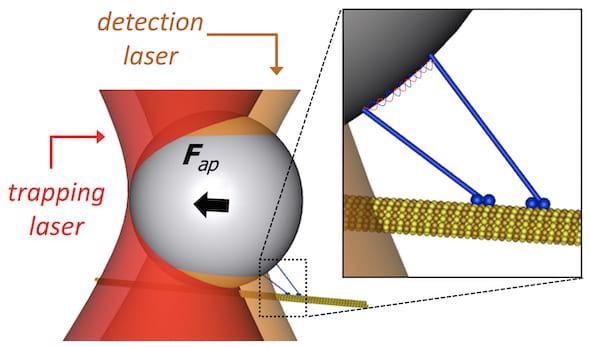Sep 9 2021Reviewed by Alex Smith
A person trying to pick up a pea with one chopstick while being blindfolded realizes the challenge faced by researchers in their efforts to manipulate single molecules. However, that will now be significantly simpler for students, engineers and scientists at Rice University.
 An illustration shows how optical trapping could be used to investigate collective, force-generating properties in a complex of motor molecules. A National Science Foundation grant to Rice University to acquire an optical tweezer will advance researchers’ investigation of biological and inorganic molecules. Image Credit: Diehl Lab.
An illustration shows how optical trapping could be used to investigate collective, force-generating properties in a complex of motor molecules. A National Science Foundation grant to Rice University to acquire an optical tweezer will advance researchers’ investigation of biological and inorganic molecules. Image Credit: Diehl Lab.
A research team headed by Sibani Lisa Biswal from the Brown School of Engineering has been awarded a $1 million National Science Foundation Major Research Instrumentation grant to develop an optical tweezer — a robust microscope that will enable scientists to manipulate, quantify and track micron-scale particles to notice how they change after a while.
The new tool will gather material scientists, biologists and physicists at Rice whose domains are turning out to be increasingly collaborative. The Lumicks C-Trap instrument will be the first one from the company in Texas and will be made available not only to scientists from Rice but also to collaborators from other institutions.
The availability of a modern machine on campus will be a great advantage to Biswal, the William M. McCardell Professor in Chemical Engineering and a professor of chemical and biomolecular engineering and materials science and nanoengineering, and co-principal investigator Michael Diehl, an associate professor of bioengineering and of chemistry, who have previously assembled their optical tweezers.
Our new faculty member Anna-Karin Gustavsson also builds her own and was excited to learn that Mike and I have, too. But it’s not a trivial thing to build or maintain, and as students come and go, we lose the knowledge we need to use it. It took us several years to win a grant to buy a commercial machine.
Sibani Lisa Biswal, Brown School of Engineering
Gustavsson, an assistant professor of chemistry who joined Rice as a CPRIT Scholar in 2020, and Robert Raphael, an associate professor of bioengineering, are also co-PIs on the project.
The discoverer of an optical tweezer was awarded a Nobel Prize in 2018. The optical tweezer makes use of laser light to drive small particles including molecules, atoms and living cells toward the core of another laser, which holds them in place without causing any harm. The tweezer functions with piconewton (one-trillionth of a newton) force.
I use the analogy that it’s like a tractor beam in ‘Star Trek,’ a beam of light able to hold and manipulate objects. The beam has a certain width that can trap the object. Once it’s trapped, it’s almost like a bead with a spring attached to a wall, so you can move it inside the trap.
Sibani Lisa Biswal, Brown School of Engineering
“If you pull it too much, it will disengage, but all of that gives us information about things like chemical bonds. Noting she’ll use the instrument to manipulate and capture images of colloidal copolymer chains assembled in her lab,” added Biswal.
Furthermore, rice researchers will use the instrument to improve their knowledge of the binding strength of proteins, the structures and dynamics of charged polymers, the physics of lipid membrane systems, the movement of particles within living cells and the function of auditory hair cells. The researchers anticipate delivery of the instrument in early 2022.
Source: https://www.rice.edu/